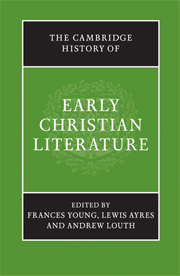Book contents
- Frontmatter
- PART ONE The Beginnings: The New Testament to Irenaeus
- PART TWO THE THIRD CENTURY
- PART THREE FOUNDATION OF A NEW CULTURE: FROM DIOCLETIAN TO CYRIL
- A LITERARY GUIDE
- 21 Classical genres in Christian guise; Christian genres in classical guise
- 22 Arnobius and Lactantius
- 23 Eusebius and the birth of church history
- 24 The fourth-century Alexandrians: Athanasius and Didymus
- 25 Palestine: Cyril of Jerusalem and Epiphanius
- 26 The Cappadocians
- 27 Fourth-century Latin writers: Hilary, Victorinus, Ambrosiaster, Ambrose
- 28 Jerome and Rufinus
- 29 Augustine
- 30 John Chrysostom and the Antiochene School to Theodoret of Cyrrhus
- 31 Cyril of Alexandria
- 32 Hagiography
- 33 Ephrem and the Syriac Tradition
- 34 The literature of the monastic movement
- 35 Women and words: texts by and about women
- 36 Conciliar records and canons
- B CONTEXT AND INTERPRETATION
- Bibliographies
- Index
- Map: The Roman Empire in the late fourth century AD"
- References
22 - Arnobius and Lactantius
from A - LITERARY GUIDE
Published online by Cambridge University Press: 28 March 2008
- Frontmatter
- PART ONE The Beginnings: The New Testament to Irenaeus
- PART TWO THE THIRD CENTURY
- PART THREE FOUNDATION OF A NEW CULTURE: FROM DIOCLETIAN TO CYRIL
- A LITERARY GUIDE
- 21 Classical genres in Christian guise; Christian genres in classical guise
- 22 Arnobius and Lactantius
- 23 Eusebius and the birth of church history
- 24 The fourth-century Alexandrians: Athanasius and Didymus
- 25 Palestine: Cyril of Jerusalem and Epiphanius
- 26 The Cappadocians
- 27 Fourth-century Latin writers: Hilary, Victorinus, Ambrosiaster, Ambrose
- 28 Jerome and Rufinus
- 29 Augustine
- 30 John Chrysostom and the Antiochene School to Theodoret of Cyrrhus
- 31 Cyril of Alexandria
- 32 Hagiography
- 33 Ephrem and the Syriac Tradition
- 34 The literature of the monastic movement
- 35 Women and words: texts by and about women
- 36 Conciliar records and canons
- B CONTEXT AND INTERPRETATION
- Bibliographies
- Index
- Map: The Roman Empire in the late fourth century AD"
- References
Summary
Rhetoric was the core of ancient education. The production of ‘good men skilled in speaking’ was not a literary affectation; it was a practical necessity in a world where public business was carried on orally. Rhetorical correctness became, therefore, the mark of the educated man; a writer who could not express himself properly was one who would not be taken seriously, like a modern scientist ignorant of mathematics. Lactantius and Arnobius were both professors of rhetoric; indeed, though neither mentions the other in his surviving works, Arnobius taught Lactantius. Both men knew that their intelligent contemporaries despised Christianity because it was crudely expressed: ‘The language is trivial and sordid,’ Arnobius’ opponents complained (Nat. 1.58.2); ‘They think nothing true except what is sweet to listen to,’ wrote Lactantius; ‘they do not therefore believe in the divine utterances because they lack adornment, and they do not trust those who interpret them because such people are generally ignorant’ (Inst. 5.1.17–18). The objection was not frivolous; it expressed a sense that Christianity was fundamentally incompatible with what was known about the way the world worked. The Christians were frankly stupid; stultitia, said their persecutors, had laid hold of them (so Galerius: Mort. 34.2; cf. Inst. 5.18.12). Lactantius and Arnobius confronted this judgment on their convictions in contrasting ways.
- Type
- Chapter
- Information
- The Cambridge History of Early Christian Literature , pp. 259 - 265Publisher: Cambridge University PressPrint publication year: 2004
References
- 1
- Cited by



